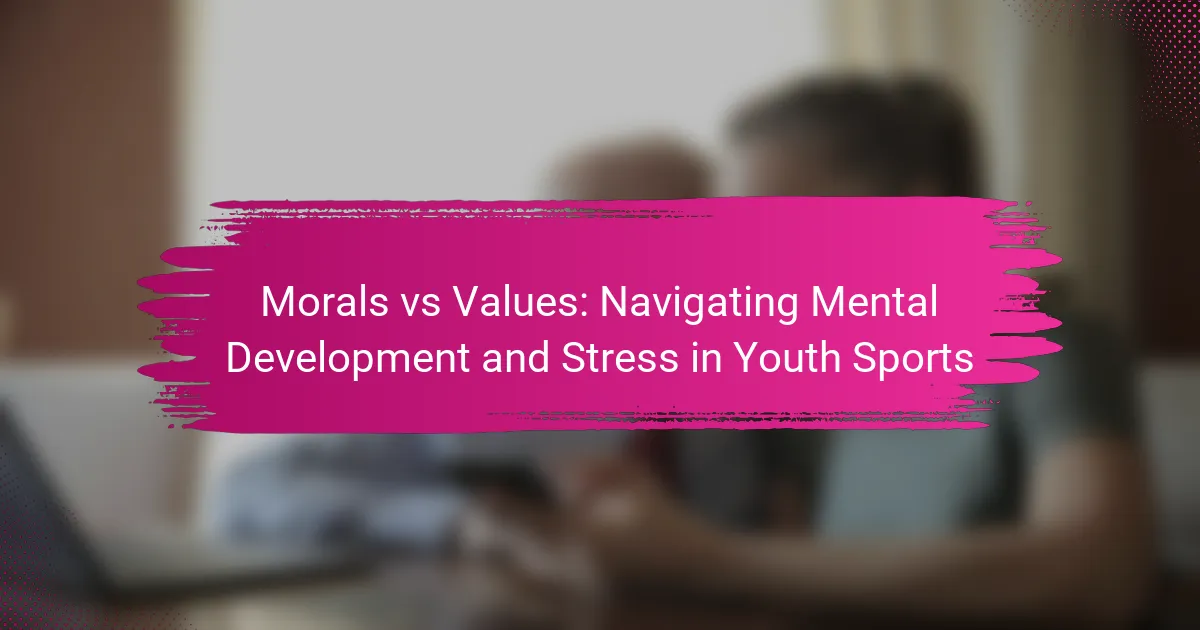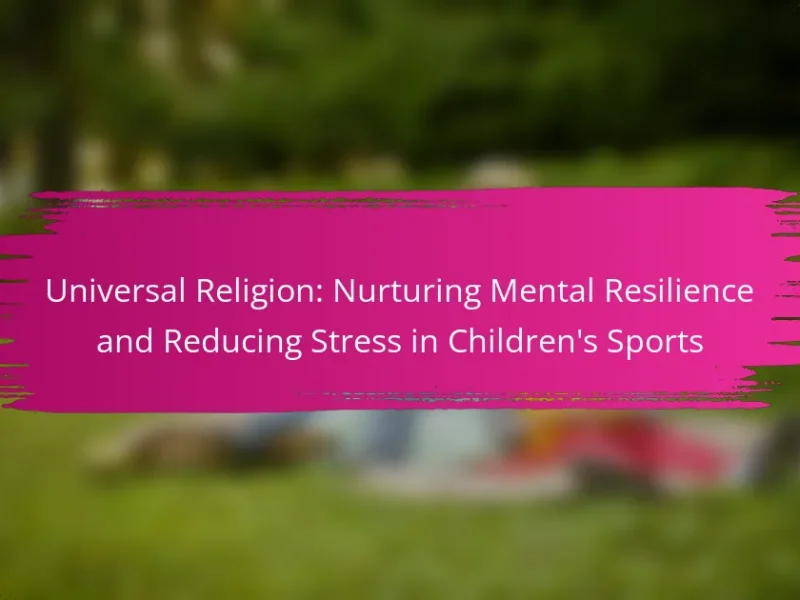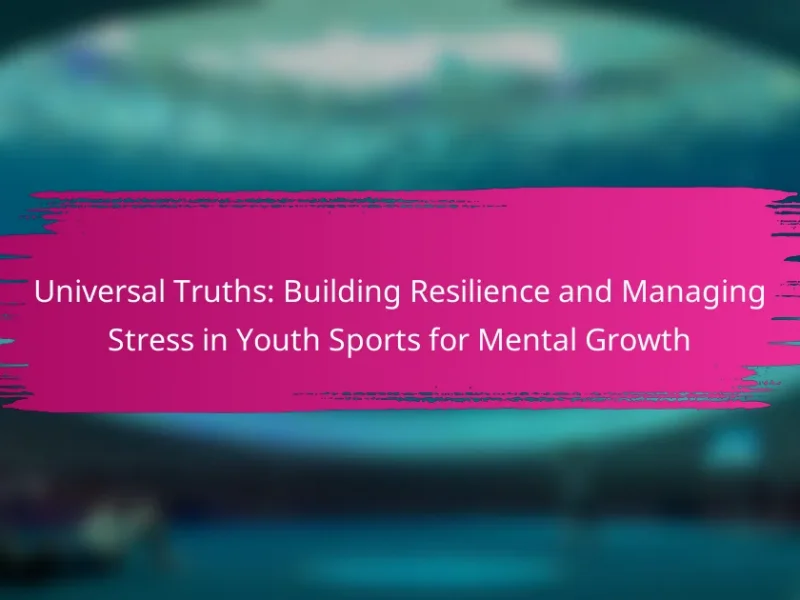Navigating the complexities of morals and values is essential for youth athletes as they face mental development challenges and stress in sports. This article explores how morals shape decision-making and resilience, the universal attributes that support mental growth, and the unique pressures young athletes encounter. It also highlights the importance of communication, a growth mindset, and ethical behavior in fostering a positive sports environment. Understanding these elements can enhance both performance and mental well-being in youth sports.

How do morals and values shape mental development in youth sports?
Morals and values significantly influence mental development in youth sports by shaping behaviors and decision-making. They provide a framework for understanding right from wrong, impacting athletes’ resilience and teamwork. For example, strong moral principles encourage fair play, reducing stress related to competition. Values such as respect and integrity foster positive relationships among teammates, enhancing emotional support. Research shows that youth involved in sports with a focus on moral education exhibit lower levels of anxiety and higher self-esteem, promoting overall mental well-being.
What are the key differences between morals and values in the context of sports?
Morals and values in sports differ primarily in their source and application. Morals are often derived from societal norms and dictate what is considered right or wrong, while values are personal beliefs that guide individual behavior. In youth sports, understanding these differences can enhance mental development and stress management. For example, a moral stance may discourage cheating, promoting fair play, while personal values might emphasize teamwork or personal excellence. Recognizing these distinctions helps coaches and parents foster a supportive environment that aligns with both moral standards and individual values, ultimately benefiting young athletes’ growth.
How do morals influence decision-making in young athletes?
Morals significantly influence decision-making in young athletes by shaping their values and behavior. A strong moral framework can lead athletes to prioritize teamwork, fairness, and respect over winning at all costs. Research indicates that athletes with well-defined morals are more likely to exhibit resilience under pressure, demonstrating ethical behavior even in challenging situations. For instance, a study found that young athletes who value integrity are less prone to cheating, enhancing their overall sports experience and mental development.
What role does parental guidance play in shaping morals?
Parental guidance plays a crucial role in shaping morals by providing a framework for ethical decision-making. This influence is particularly significant in youth sports, where competitive environments can challenge personal values. Parents model behaviors that reinforce honesty, respect, and teamwork, essential components of moral development. As a result, children learn to navigate stress and ethical dilemmas effectively, fostering resilience and integrity in their sporting endeavors. Studies indicate that strong parental support correlates with positive moral outcomes in young athletes, highlighting the unique impact of guidance during formative years.
How can coaches instill positive values in their teams?
Coaches can instill positive values in their teams by modeling ethical behavior, fostering open communication, and encouraging teamwork. They should emphasize respect, integrity, and accountability as core principles. By creating a supportive environment, coaches help athletes develop resilience and a strong moral foundation. Regular discussions about values can reinforce these lessons, enhancing mental development and reducing stress in youth sports.
What are the common stressors faced by young athletes?
Young athletes commonly face stressors such as performance pressure, time management, and injury concerns. These factors can impact their mental development significantly. Performance pressure stems from expectations set by coaches, parents, and peers, leading to anxiety and fear of failure. Time management challenges arise as athletes juggle training, competitions, and academic responsibilities. Injury concerns create additional stress, as the fear of setbacks can hinder their confidence and focus. Addressing these stressors is crucial for promoting healthy mental development in youth sports.
How does competition affect mental health in children?
Competition can negatively impact mental health in children by increasing stress and anxiety. High pressure to perform often leads to feelings of inadequacy and fear of failure. Research indicates that children exposed to intense competition may experience lower self-esteem and higher rates of burnout. Additionally, the emphasis on winning can overshadow the importance of teamwork and personal growth, further complicating their mental development. Balancing competition with supportive environments is crucial for fostering resilience and well-being in youth sports.
What impact does peer pressure have on youth sports participation?
Peer pressure can significantly influence youth sports participation, often leading to increased motivation or stress. Positive peer pressure encourages teamwork and commitment, enhancing enjoyment and skill development. Conversely, negative peer pressure may result in anxiety, burnout, or withdrawal from sports. Research indicates that 60% of youth athletes report feeling pressured to perform, impacting their mental health and overall experience. Balancing these pressures is crucial for healthy participation in youth sports.

What universal attributes contribute to mental development in youth sports?
Universal attributes that contribute to mental development in youth sports include resilience, teamwork, discipline, and emotional regulation. These attributes foster personal growth and coping strategies, essential for managing stress. Resilience helps youth bounce back from setbacks, while teamwork enhances social skills and cooperation. Discipline instills a strong work ethic, and emotional regulation aids in controlling reactions to pressure. Collectively, these attributes support holistic mental development.
How does physical activity promote cognitive growth?
Physical activity enhances cognitive growth by improving brain function and emotional resilience. Engaging in sports fosters critical thinking, problem-solving, and teamwork skills. Research indicates that regular exercise increases neurogenesis, particularly in youth, leading to better memory and learning capabilities. Moreover, physical activity reduces stress, allowing young athletes to focus better and develop a positive self-image, essential for their mental development.
What role does teamwork play in emotional intelligence?
Teamwork enhances emotional intelligence by fostering communication, empathy, and collaboration among youth athletes. It encourages individuals to understand and manage their emotions while recognizing others’ feelings. This dynamic promotes resilience and reduces stress, crucial for mental development in youth sports. Effective teamwork also cultivates a supportive environment, allowing young athletes to navigate challenges collectively. By prioritizing teamwork, youth sports can significantly contribute to the emotional growth and overall well-being of participants.

What unique challenges do young athletes face regarding stress management?
Young athletes face unique challenges in stress management due to high expectations, competition pressure, and balancing academics. These factors can lead to anxiety and burnout.
High expectations from coaches and parents often create immense pressure. Athletes may feel they must constantly perform at peak levels, which can hinder their mental well-being.
Competition pressure intensifies stress, especially during critical events. The fear of failure can lead to performance anxiety, affecting not only their sports performance but also their overall mental health.
Balancing academics and sports presents another challenge. Young athletes often struggle to manage time effectively, leading to increased stress and potential burnout. This dual commitment can compromise their academic performance and personal life.
How do performance expectations affect young athletes’ mental health?
Performance expectations can significantly impact young athletes’ mental health by increasing stress and anxiety levels. High expectations may lead to performance pressure, causing feelings of inadequacy and burnout. Research indicates that athletes with supportive environments experience better mental health outcomes. Balancing performance goals with emotional well-being is crucial for healthy development.
What are the implications of early specialization in sports?
Early specialization in sports can lead to increased stress and mental health issues in youth athletes. This approach often prioritizes competitive success over holistic development, impacting their emotional well-being. Research indicates that athletes specializing too early may experience burnout, anxiety, and a decreased love for the sport. Furthermore, the lack of diverse experiences can hinder the development of essential life skills, such as teamwork and resilience. Balancing specialization with varied athletic exposure can promote healthier mental development and reduce stress.
How can families support balanced participation in multiple sports?
Families can support balanced participation in multiple sports by encouraging diverse interests, fostering teamwork, and prioritizing mental well-being. Engaging in various sports promotes physical health and develops essential life skills. Parents should communicate openly with their children about their preferences and stress levels. This approach helps prevent burnout and ensures a positive experience in youth sports. Additionally, emphasizing the joy of participation over competition nurtures a healthy mindset and supports overall development.

What rare but notable traits influence youth sports experiences?
Rare traits influencing youth sports experiences include emotional intelligence, resilience, and ethical decision-making. These traits shape how young athletes handle competition and stress. Emotional intelligence allows for better communication and teamwork. Resilience helps them cope with setbacks, fostering a growth mindset. Ethical decision-making guides their actions, promoting fairness and respect. Cultivating these attributes enhances overall development and enjoyment in sports.
How does cultural background affect perceptions of success and failure?
Cultural background significantly shapes perceptions of success and failure in youth sports. Different cultures emphasize distinct values, influencing how young athletes interpret achievements and setbacks. For instance, collectivist cultures may prioritize teamwork and community recognition, while individualistic cultures often focus on personal accolades. This divergence can impact motivation, stress levels, and mental development, as athletes navigate their unique cultural expectations. Understanding these influences is crucial for coaches and parents to support youth effectively.
What are the long-term effects of youth sports on mental resilience?
Participation in youth sports can enhance mental resilience over the long term. Engaging in sports teaches coping strategies, teamwork, and discipline, which contribute to a stronger mindset. Studies indicate that young athletes are more likely to develop better stress management skills compared to non-athletes. This unique attribute of youth sports fosters emotional regulation, leading to improved mental health outcomes. Additionally, the experience of facing challenges in sports builds confidence and adaptability, essential traits for overcoming life’s obstacles.

What strategies can be employed to navigate morals and values in youth sports?
To navigate morals and values in youth sports, coaches and parents should prioritize open communication, instill a growth mindset, and model ethical behavior. These strategies foster mental development and reduce stress among young athletes.
Open communication encourages youth to express their feelings about competition and teamwork. This dialogue helps in addressing moral dilemmas and reinforces the importance of integrity.
Instilling a growth mindset allows athletes to view challenges as opportunities for learning. This perspective reduces pressure and promotes resilience in the face of setbacks, aligning with core values of sportsmanship.
Modeling ethical behavior is crucial; adults should demonstrate fairness and respect in all interactions. This sets a standard for young athletes to emulate, reinforcing the significance of moral values in sports.
How can open communication improve mental health in young athletes?
Open communication significantly enhances mental health in young athletes by fostering trust and reducing stress. It creates an environment where athletes feel safe to express their concerns and emotions. This openness can lead to improved emotional resilience and coping strategies. As a result, young athletes are better equipped to handle the pressures of competition and training. Studies show that athletes who engage in open dialogue with coaches and peers report lower anxiety levels and higher overall satisfaction in their sports experience.
What best practices can coaches implement to foster a positive environment?
Coaches can foster a positive environment by promoting open communication, setting clear expectations, and encouraging teamwork. They should model respect and integrity, emphasizing the importance of morals in sports. Regular feedback and recognition of individual contributions also enhance motivation. Creating a safe space for players to express themselves further supports mental development.
What common mistakes should parents avoid in supporting young athletes?
Parents should avoid imposing unrealistic expectations on young athletes. This pressure can lead to stress and hinder mental development. Another common mistake is prioritizing competition over enjoyment, which can diminish a child’s passion for the sport. Additionally, parents often overlook the importance of open communication, leading to misunderstandings about goals and experiences. Lastly, neglecting the balance between sports and other life aspects can cause burnout, affecting overall well-being.
How can young athletes develop their own moral compass?
Young athletes can develop their moral compass by engaging in self-reflection and learning from experiences. They should prioritize understanding the difference between morals and values, which helps them navigate ethical dilemmas in sports. Encouraging open discussions about ethical behavior with coaches and peers fosters a supportive environment. Additionally, exposure to diverse perspectives through team interactions enhances their ability to empathize and make principled decisions. Practicing sportsmanship and accountability reinforces their commitment to integrity, shaping their moral framework over time.


